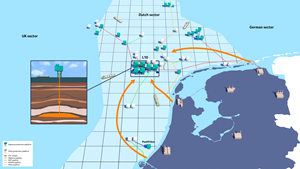ExxonMobil, Neptune Energy progress large-scale CCS project in Danish North Sea
(WO) – L10CCS, one of the large stores to be connected to the Aramis CO₂ transport and storage initiative in the Dutch part of the North Sea, has entered the next phase in the project, Front End Engineering Design (FEED).
Neptune Energy and its partners EBN, Tenaz Energy and ExxonMobil Netherlands CCS have successfully progressed the L10CCS project from the Concept Select phase, which includes various technical and economic assessments, into this next Define/FEED phase.
L10CCS seeks to store 5 MM tonnes of CO₂ annually, equivalent to a third of the total CO2 emissions from Dutch domestic vehicles in one year. All partners have signed up to a FEED Cooperation Agreement and Neptune has awarded the Facilities FEED contract to Petrofac, with the contract having kicked off last month.
The storage license application for L10CCS was submitted in the second quarter of 2023. The project is awaiting award of the license by the Dutch Ministry of Economic Affairs & Climate Policy. Talks with emitters, looking for a safe place to store their carbon in depleted gas fields under the North Sea, are ongoing and necessary contractual arrangements will be progressed during this project phase.
Completion of the technical FEED scopes is anticipated during the second half of 2024, with a view to progressing towards a project Final Investment Decision (FID) shortly thereafter in 2025. The timeline of L10CCS is fully aligned with the Aramis project timeline and is planned to be connected and operational as of day 1 of the opening of this CO2 transport system, now planned in 2028.
Lex de Groot, Managing Director of Neptune Energy in the Netherlands, the operator of L10CCS, said, “CCS is expected to account for nearly 15% of the cumulative reduction in CO2 emissions in the EU, according to the IEA Sustainable Development Scenario.
“Without CO₂ storage it would not be possible to meet the climate goals. To create a well-functioning CCS market, both emitters and storage providers need CO₂ transport. The region around L10 has a potential storage capacity up to 120-150 MT, so will play a crucial role in helping achieve climate goals and open up possibilities for many emitters that need safe CO₂ storage in the North Sea at low costs.”
Lead image source: Aramis CCS



